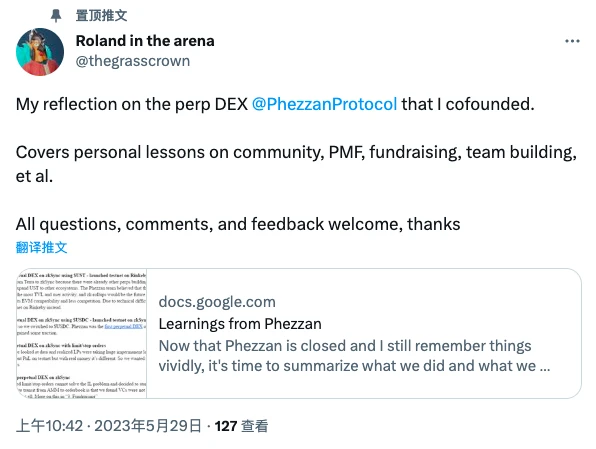A Web3 Entrepreneur's Account of Failure
Author: ODAILY Planet Daily
About a month ago, the zkSync ecosystem's decentralized perpetual contract protocol Phezzan Protocol informed the community of its decision to shut down the project.
As one of the earliest DeFi projects to deploy perpetual contract products on the zkSync 2.0 testnet, Phezzan Protocol had iterated through several product versions alongside the technical upgrades of zkSync 2.0. However, it is lamentable that shortly after zkSync 2.0 officially launched its mainnet and was renamed zkSync Era, the once-promising Phezzan Protocol faced an untimely failure.
On May 29, Phezzan Protocol founder Roland published an article on his personal Twitter, reflecting on the experiences and lessons learned from the failure of Phezzan Protocol. The content covers various aspects such as financing, team building, and community operation, which may provide some insights for entrepreneurs also working in the Web3 space.

Due to the length of the full text, Odaily Planet Daily will extract some core content and present it after compilation and organization, hoping it can be of help to you.
About the Product
Roland mentioned that Phezzan Protocol started in early 2022, but after 15 months of development, there was still no viable product. This was not due to a lack of effort from the team, but rather because they never found the right direction, leading to multiple shifts in development focus—initially wanting to adopt an AMM model, but later realizing that AMM struggled to solve the impermanent loss issue and that VCs were not particularly interested in AMM. They then shifted to an order book model, only to find it difficult to differentiate from other order book contract protocols.
The lesson Roland derived from this is, before choosing to start a business, you need to find the right direction; you must at least clarify what you want to create.
About Financing
Phezzan Protocol's financing lasted over a year and received support from some VCs and angel investors, but overall it was not successful. Roland's lessons from this process include:
You need to have the ability to tell a good story. You must clearly convey your vision to VCs; if they cannot understand your ideas, do not expect users to understand them either.
Networking is very important. Since the Phezzan Protocol team did not have any full-time crypto professionals prior, their network within the industry was not well-developed, forcing the team to reach out to potential investors through various public social media channels.
First find a suitable lead investor. The Phezzan Protocol team spent a lot of time reaching out to various investment institutions, only to realize that finding a good lead investor is more important. A strong lead investor can significantly accelerate the financing process.
Timing is crucial. Phezzan Protocol intended to start financing when significant progress was made on the testnet to prove its strength to VCs, but after the launch of the Rinkeby testnet, they encountered the Terra crash, and after the launch of the zkSync 2.0 testnet, they faced the FTX collapse… So if you cannot judge market trends, it’s better to start financing early; things can change over time.
Communicate more with VCs. If you are unsure about what you are doing (of course, if you are confident in what you are doing, that’s another story), you can communicate more with VCs. If no one likes it, change the mechanism; if after two or three changes it’s still not appealing, try something completely different. VCs have seen many cases and may offer you advice that exceeds your own experience.
About the Community
Roland gave an analogy: building a community before the product fits the market is like building a sandcastle; you might have fun, but it doesn’t necessarily lead to a good outcome.
For any project, using some growth hacks (like airdrop announcements) at the beginning can easily create a "community," but this approach will only attract airdrop hunters, whose actual conversion rate may be less than 1%.
Therefore, you need to forget about the community at the start and focus on the product. Once you have created something, then use those growth hacks, and from the feedback, filter out the truly valuable users, listen to their suggestions, and refine your product.
About BD
Simply put, filter all the collaboration requests you receive and be patient with the projects you want to collaborate with.
About the Team
Phezzan Protocol assembled a great team, and the engineers executed the team's ideas perfectly.
The only issue was that due to remote work, team members were too far apart, which not only increased communication costs but also inadvertently fostered inertia. Roland summarized that remote work requires good self-discipline and excellent management skills; if possible, team members should meet at least once a month.
About Yourself
You need to be kinder to yourself, which is especially important for all entrepreneurs.
Roland stated, "Throughout the entrepreneurial journey of Phezzan Protocol, we were always thinking about the mistakes we made and how we could do better; we worried about the past, present, and future; we felt responsible for everything that went wrong in the project. This pressure consumed us and devoured us; it is not a healthy mental state."
So please be kinder to yourself; if needed, take a break. There is life outside of work, and you should learn to enjoy the entrepreneurial process.
As for compensation, do not be harsh on yourself by cutting your salary. Roland's salary during the construction of Phezzan Protocol was only 20%-30% of what it used to be, which affected his daily life. Investors do not care how much you, as a founder, earn, as long as it is not excessively high.










